(完整)pep小学英语六年级下过去式练习题
人教PEP版六年级下册英语期末小升初 一般过去时训练(含答案)
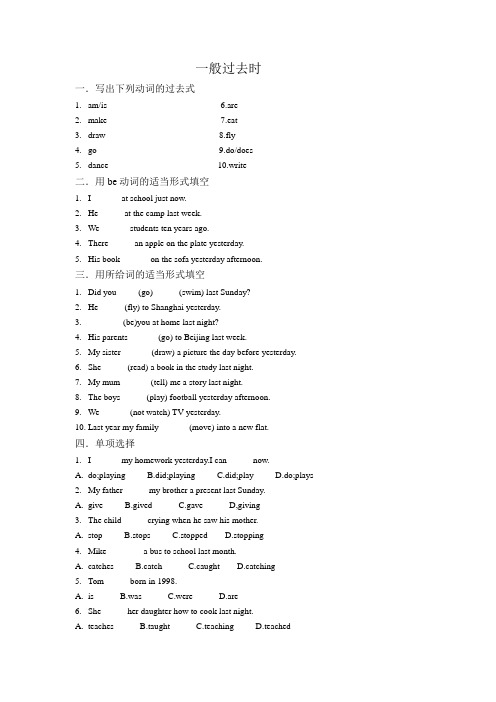
一般过去时一.写出下列动词的过去式1.am/is__________ 6.are__________2.make____________ 7.eat___________3.draw___________ 8.fly___________4.go______________ 9.do/does_________5.dance___________ 10.write___________ 二.用be动词的适当形式填空1.I_______at school just now.2.He______at the camp last week.3.We_______students ten years ago.4.There______an apple on the plate yesterday.5.His book_______on the sofa yesterday afternoon.三.用所给词的适当形式填空1.Did you_____(go)______(swim) last Sunday?2.He______(fly) to Shanghai yesterday.3.________(be)you at home last night?4.His parents_______(go) to Beijing last week.5.My sister_______(draw) a picture the day before yesterday.6.She______(read) a book in the study last night.7.My mum_______(tell) me a story last night.8.The boys______(play) football yesterday afternoon.9.We_______(not watch) TV yesterday.st year my family_______(move) into a new flat.四.单项选择1.I_______my homework yesterday.I can______now.A.do;playingB.did;playingC.did;playD.do;plays2.My father______my brother a present last Sunday.A.giveB.givedC.gave D,giving3.The child______crying when he saw his mother.A.stopB.stopsC.stoppedD.stopping4.Mike________ a bus to school last month.A.catchesB.catchC.caughtD.catching5.Tom______born in 1998.A.isB.wasC.wereD.are6.She______her daughter how to cook last night.A.teachesB.taughtC.teachingD.teached7.-What did you do last weekend?-I_________.A.go swimmingB.did my homeworkC.went swimD.do my homework8.I_______to the park last week.A.goB.goesC.wentD.going9._______ he______his homework yesterday?A.Does;doB.Did;didC.Did;doD.Was;doing10.The students_______trees yesterday morning.A.plantedB.plantsC.plantD.planting五.句型转换1.I often swim on Sunday afternoon.(用yesterday afternoon改写句子)2.Tom went shopping with his mum.(改为一般疑问句)3.I do my homework last night.(改为否定句)4.Tom is doing his homework now.(用just now改写句子)5.My father went to Beijing.(对划线部分提问)六.中译英1.当她在北京时经常来看我__________________________________2.寒假里我每天早起朗读英语。
六年级英语动词过去式练习题40题含答案解析
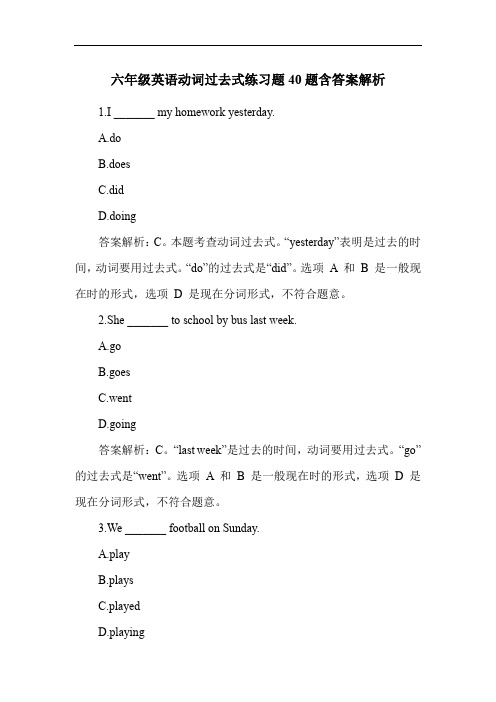
六年级英语动词过去式练习题40题含答案解析1.I _______ my homework yesterday.A.doB.doesC.didD.doing答案解析:C。
本题考查动词过去式。
“yesterday”表明是过去的时间,动词要用过去式。
“do”的过去式是“did”。
选项 A 和B 是一般现在时的形式,选项D 是现在分词形式,不符合题意。
2.She _______ to school by bus last week.A.goB.goesC.wentD.going答案解析:C。
“last week”是过去的时间,动词要用过去式。
“go”的过去式是“went”。
选项 A 和B 是一般现在时的形式,选项D 是现在分词形式,不符合题意。
3.We _______ football on Sunday.A.playB.playsC.playedD.playing答案解析:C。
“on Sunday”在这里可以理解为过去的某个周日,要用过去式。
“play”的过去式是“played”。
选项 A 和 B 是一般现在时的形式,选项D 是现在分词形式,不符合题意。
4.He _______ a book last night.A.readB.readsC.readingD.readed答案解析:A。
“last night”是过去的时间,“read”的过去式还是“read”,只是读音不同。
选项B 是一般现在时的形式,选项C 是现在分词形式,选项D 拼写错误。
5.They _______ a picnic last month.A.haveB.hasC.hadD.having答案解析:C。
“last month”是过去的时间,动词要用过去式。
“have”的过去式是“had”。
选项 A 和B 是一般现在时的形式,选项D 是现在分词形式,不符合题意。
6.I _______ TV in the evening.A.watchB.watchesC.watchedD.watching答案解析:C。
(完整word版)六年级英语下册一般过去式练习题
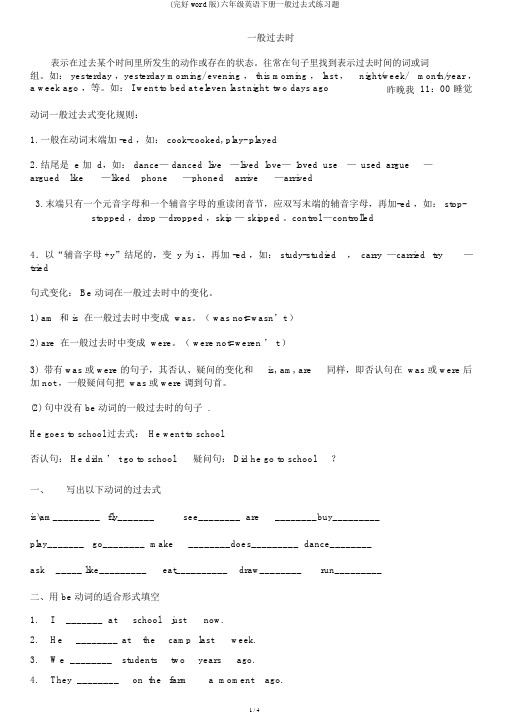
一般过去时表示在过去某个时间里所发生的动作或存在的状态。
往常在句子里找到表示过去时间的词或词组。
如: yesterday ,yesterday morning/ evening , this morning , last ,a week ago ,等。
如: I went to bed at eleven last night. two days ago night/week/昨晚我month/year ,11:00 睡觉动词一般过去式变化规则:1.一般在动词末端加 -ed ,如: cook-cooked, play- played2.结尾是 e 加 d,如: dance— danced live —lived love—loved use—used argue—argued like—liked phone—phoned arrive—arrived3.末端只有一个元音字母和一个辅音字母的重读闭音节,应双写末端的辅音字母,再加-ed ,如: stop-stopped ,drop —dropped ,skip — skipped 。
control —controlled4.以“辅音字母 +y”结尾的,变 y 为 i ,再加 -ed ,如: study-studied,carry—carried try—tried句式变化: Be 动词在一般过去时中的变化。
1)am 和 is 在一般过去时中变成 was。
( was not=wasn’t )2)are 在一般过去时中变成 were。
( were not=weren ’ t )3) 带有 was 或 were 的句子,其否认、疑问的变化和is, am, are同样,即否认句在 was 或 were 后加 not ,一般疑问句把 was或 were 调到句首。
(2) 句中没有 be 动词的一般过去时的句子 .He goes to school.过去式:He went to school.否认句: He didn ’ t go to school.疑问句: Did he go to school?一、写出以下动词的过去式is\am_________ fly_______see________ are________buy_________play_______ go________ make________does_________ dance________ask_____ like_________eat__________draw________run_________二、用 be 动词的适合形式填空1.I_______ at school just now.2.He________at the camp last week.3.We ________students two years ago.4.They ________on the farm a moment ago.5.Yang Ling________eleven years old last year.6.There________an apple on the tree yesterday.7.There________some cola in the fridge on Sunday.8.The mobile phone_______on the sofa yesterday evening.9.I ______an English teacher now.10.She _______ happy yesterday.11. They _______ glad to see each other last month.12.Helen and Nancy ________ good friends.13.The little dog_____two years old this year.14.Look,there________lots of grapes here.15.There________ a sign on the chair on Monday..三、用动词的适合形式填空1.He_________(live)in Lin tong two years ago.2.The cat________(eat)a bird last night.3.We_______(have)a party last Halloween.4.I________(make)a model ship with Mike yesterday.5.They________(play)chess in the classroom last PE lesson.6.My mother_______(cook)a nice food last Spring Festival.7.The girls________(sing)and_______(dance)at the party.8.I______ (watch)a cartoon on Saturday.9.Her father_______(read)a newspaper last night.10.We_________to zoo yesterday,we_____to the park. (go)11.______you_______(visit)your relatives last Spring Festival?12.______he_______(fly)a kite on Sunday?Yes,he______.13What___ she __(find)in the garden last morning?She__(find) a beautifu l butterfly.14. It______ (be) Ben’ s birthday last Friday.15.We all______(have)a good time last night.16.He________(jump)high on last Sports Day.17.She likes_____ newspapers,but she______a book yesterday.(read)18.He_______football now,but they_______basketball just now.(play)19.We___________(go) to school on Sunday.20.It___(be)the2nd of November yesterday.Mr White ____(go)to his office by car.21.Gao Shan________(put)the book on his head a moment ago.22.Don’t______the house.Mum _______it yesterday.(clean)23.What____ you______just now?I______some housework.(do)24.They_________(make)a kite a week ago.25.I want to_____(eat )apples.But my dad_______(eatup)all of them yesterday.1、英语需要记忆,由于它是一种语言学习,所以今日讲堂中所波及的动词及其过去式要记着,背诵方式你来定,我只需结果! Fighting!2、课本 69 页不规则动词记忆。
一般过去时专项练习(试题)人教PEP版英语六年级下册

小升初一般过去时专项练习班级学号姓名用动词过去式填空(共50小题)1.We_ (HA VE) a lot of fun at your birthday party yesterday.2.My brother and I_ (FINISH) our homework a few minutes ag3. Susan_ (LIKE) skating when she was a girl.4.Joe_ (BREAK) his leg three weeks ago.5.I______(MEET) my best friend George in 2005two days ago.6. My parents_ (GO) to the theatre yesterday evening.7.He_ (WATCH) a very scary film last night.8. Emma_ (NOT GO) to school when she was ill.9.Where________you_ (LEA VE) your jacket?10.________you (HATE) broccoli when you were a child?11. Peter_ (READ) a very interesting book yesterday.12. Mum_ (MAKE) a big chocolate cake a few hours ago.13. We_ (PLAY) beach volleyball when we were at the seaside.14.He_ (NOT LISTEN) to music after school yesterday.15.I_ (GET) lots of good marks last month.16._ they_ (VISIT) their grandparents last summer?17. He was very thirsty. He_ (DRINK) two glasses of water.18. Sarah_ (NOT ENJOY) her piano lessons when she was seven.19.Where_ your father_ (WORK) in 1985?20.They_ (SEE) lots of animals in the zoo yesterday.21. Dan ________(leave) very early today.22. Sam and Sue________(buy) a new house last month.23. I ________ (visit) Germany the previous week.24. You ________(play) very well.25. They ________(find) this book on their trip to Italy.26. I________(bake) this cake by myself.27. We ________(open) the store in 1987.28. The rain finally ________(stop), and we________(go) home.29. She ________ (plan) to come, but she ________ (have) some problems.30. Kate ________(have) a big house, but she________(sell) it.31. Rose ________ (be) very thin.32. You ________ (be) at work yesterday morning.33. We ________(think) New York was in England!34. They ________(bring) this from their trip.35. She always________ (dance) in the summer then.36. Barbara ________ (eat) the whole cake last night.37. I ________ (save) some money last year.38. You ________(give) me all the books yesterday.39. I ________ (come), I ________(see), I ________(leave).40. They ________(drink) too much just now.41. We ________(be) very happy together then.42. The cat ________(jump) on the tree, and the bird ________(fly) away.43. We always ________(cook) together last year.44. She ________(arrive) in 1978.45. Emily and Edward ________ (meet) in Paris.46. Peter ________ (change) his name many years ago.47. Julie ________ (move) from Canada last month.48. They ________(sing) a few songs together.49. We ________ (have) a lot of friends there.50.He________ (break) his tooth last week.参考答案:1.had2.finished3.liked4.broke5.met6.went7.watched8.didn't go9.did ;leave10.Did ;hate11.read12.made13.played14.didn't listen15.got16.Did ;visit17.drank18.didn't enjoy19.did ,work20.saw21.left22.bought23.visited24.played25.Found26.baked27.Opened28.stopped,went29.planned ,had30.had ;sold.31.was.32.were .33.thought34.brought35.danced.36.ate37.saved38.Gave39.came, saw,left.40.drank41.were42.Jumped,flew43.cooked44.arrived45.met46.changed47.moved48.sang49.hadbroke。
人教版(PEP)英语六年级下册语法练习 一般过去时动词变形练习
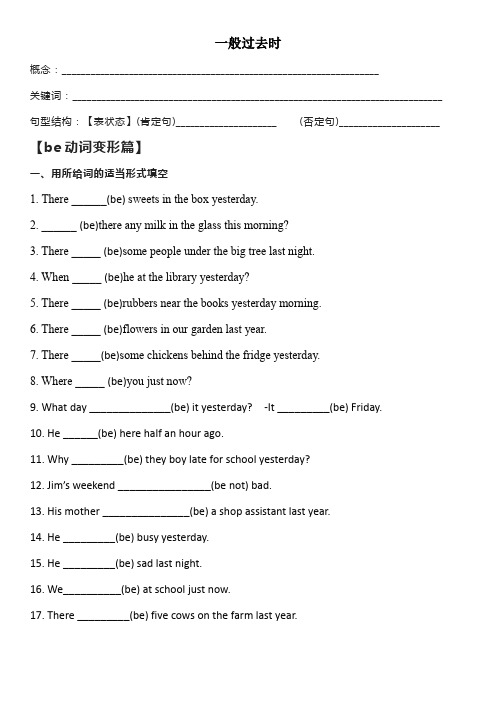
一般过去时概念:__________________________________________________________________关键词:_____________________________________________________________________________ 句型结构:【表状态】(肯定句)_____________________ (否定句)_____________________ 【be动词变形篇】一、用所给词的适当形式填空1. There ______(be) sweets in the box yesterday.2. ______ (be)there any milk in the glass this morning?3. There _____ (be)some people under the big tree last night.4. When _____ (be)he at the library yesterday?5. There _____ (be)rubbers near the books yesterday morning.6. There _____ (be)flowers in our garden last year.7. There _____(be)some chickens behind the fridge yesterday.8. Where _____ (be)you just now?9. What day ______________(be) it yesterday? -It _________(be) Friday.10. He ______(be) here half an hour ago.11. Why _________(be) they boy late for school yesterday?12. Jim’s weekend ________________(be not) bad.13. His mother _______________(be) a shop assistant last year.14. He _________(be) busy yesterday.15. He _________(be) sad last night.16. We__________(be) at school just now.17. There _________(be) five cows on the farm last year.18. .---________(be) you at home yesterday? ---No, I ________ (be) in the bookshop.三、按要求完成句子1.There is an apple.(改为过去时)__________________________________________________________________________ 2.My weekend is not bad. (改为过去时)__________________________________________________________________________ 3.His father is an engineer. (改为过去时)__________________________________________________________________________ 4.There were some books in my bag yesterday.(改为否定)__________________________________________________________________________ 5.There were many people at the race.(改为一般疑问句,并作否定回答)一般疑问句:_______________________________________________________________否定回答:_________________________________________________________________【动词变形篇】一、写出下列单词的过去式1.work _________ 4. worry ________ 7. stop _________2.look _________ 5. play __________ 8. do __________3.hope _________ 6. enjoy _________ 9. is __________二、用括号内所给词的适当形式填空1. _______ you ______ (go) to the Great Wall last year?2. The old man _______(be)ill and went to see a doctor.3. — How _______ (be) the students?— They were very friendly.4. He often _______ (have) supper at home, but he __________ (not have) supper at home yesterday.5. — ______ he _______ (have) lunch at nine? — No, he didn’t.6.They _________(stay) at school yesterday.7. I _________ (have) an exciting party last weekend.8. They all __________(go) to school yesterday.9. He ___________(teach) us in 2008.10. He usually _________ (get) up at 6 o’clock in the morning, but he ________(have) to get up very early yesterday morning because he wanted to catch a train.三、按要求改写句型【注意口诀:无be无情,请求助,有助则原】1.She liked pink last year.(改为否定句)I studied English two years ago.(改为否定句)_____________________________________________________________________ 2.There were some cars yesterday. (改为一般疑问句,并作肯定回答)一般疑问句:__________________________________________________________肯定回答:____________________________________________________________ 3.He played football last night.(改为一般疑问句,并作否定回答)一般疑问句:__________________________________________________________否定回答:____________________________________________________________。
英语人教版六年级下册一般过去时练习
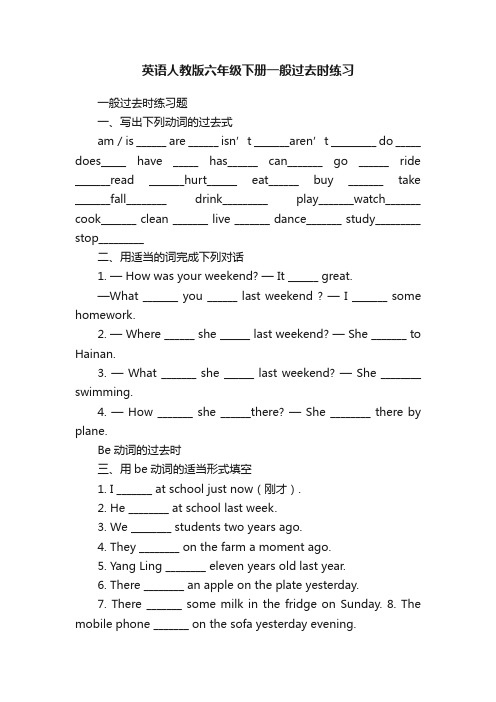
英语人教版六年级下册一般过去时练习一般过去时练习题一、写出下列动词的过去式am/is ______ are ______ isn’t _______aren’t _________ do _____ does_____ have _____ has______ can_______ go ______ ride _______read _______hurt______ eat______ buy _______ take _______fall________ drink_________ play_______watch_______ cook_______ clean _______ live _______ dance_______ study_________ stop_________二、用适当的词完成下列对话1. — How was your weekend? — It ______ great.—What _______ you ______ last weekend ? — I _______ some homework.2. — Where ______ she ______ last weekend? — She _______ to Hainan.3. — What _______ she ______ last weekend? — She ________ swimming.4. — How _______ she ______there? — She ________ there by plane.Be动词的过去时三、用be动词的适当形式填空1. I _______ at school just now(刚才).2. He ________ at school last week.3. We ________ students two years ago.4. They ________ on the farm a moment ago.5. Yang Ling ________ eleven years old last year.6. There ________ an apple on the plate yesterday.7. There _______ some milk in the fridge on Sunday. 8. The mobile phone _______ on the sofa yesterday evening.9. I ______ an English teacher now. 10. She _______ happy yesterday.11. They _______ happy to see each other last month. 12. Helen and Nancy ________ good friends.13. Look, there ________ lots of grapes here. 14. There ________a sign on the chair on Monday..15. Today _____ June 2nd. Yesterday ______ June 1st. It _____ Children’s Day. All the students ______ very ex cited.四、句型转换1. My winter holiday was great. 否定句:____________________________一般疑问句:_____________________________ 肯、否定回答:_____________________________对划线部分提问:_________________________________________2. The students were excited. 否定句:__________________________________一般疑问句:_______________________________ 肯、否定回答:___________________________3. There was a car in front of the house just now. 否定句:___________________________________一般疑问句:________________________________ 肯、否定回答:_________________________ 4. There were no computers or Internet in my time. 否定句:____________________________________ 一般疑问句:________________________________ 肯、否定回答:_________________________行为动词的过去时五、用行为动词的适当形式填空1. He _________ (live) in Wuxi two years ago.2. The cat ________ (eat) a bird last night.3. We _______ (have) a party last Halloween.4. Her father _______ (read) a book last night.5. I ______ (watch) a cartoon last Saturday.6. They ________ (play) football last PE lesson.7. My mother _______ (cook) fish last night.8. ——______ he _______ (fly) a kite on Sunday? ——Yes, he ______.9. ______ you _______ (visit) your grandparents last Spring Festival? No, I ________ 六、句型转换1. I took some photos at the Sports day. 否定句:____________________________________一般疑问句:_________________________________________ 肯、否定回答:_______________________ 对划线部分提问:_________________________________________2. Nancy went to Tianmen last week. 否定句:________________________________一般疑问句:__________________________________ 肯、否定回答:______________________________ 对划线部分提问:_________________________________________3. We read some film magazines. 否定句:________________________________一般疑问句:_________________________________ 肯、否定回答:_____________________4. They played football in the playground. 否定句:____________________________________一般疑问句:_________________________________________ 肯、否定回答:______________________综合练习七、选择填空1.( ) _____ he ________ a good rest? No, he didn’t. A. Do, hadB. Did, haveC. Did, hadD. Was, had2.( ) When _____ Lee _____ school this morning? A. did, got toB. did, get toC. did, getD. did, got3.( ) ____you ___at six o’clock yesterday? A. Do ,get up B. Did, get up C. Do, got up D. Did, got up4.( ) —What _____ you _______ last week? —I bought a bag.A. did ,buyB. did , boughtC. do, buyD. do, bought5.( ) —_____ he ____ his lunch? — Yes, he did. A. Does ,has B. Does, have C. Did, have D. Did, had6.( )—Did the thieves _____ into the car? —No, they______.A. fell, didn’tB. fall(落下), didC. jump(跳), didn’tD. jump, did7.( ) ____ she _____ this dictionary in the bookshop nearby last week?A. Did, buyB. Does, buyC. Did, boughtD. Does, buys8.( ) Where _____ Uncle Sun yesterday? A. was B. were C. didD. does9.( ) —Have you seen him today? —Yes, I ____ him this morning. A. seeing B. see C. sees D. saw10.( ) He ______ worried when he had a cold. A. is B. was C. does D. did11.( ) There _____ a telephone call for my brother Steven yesterday? A. is B. are C. was D. were12.( ) We ______ an English play a moment ago. A. see B. seesC. saw13.( ) He ________ the clothes yesterday. A. didn’t wash B. didn’t washed C. don’t washed14.( ) It ______ a windy day yesterday. A. is B. was C. am15.( ) What ______ you usually(经常地)do on the weekend?A. areB. doC. did16.( ) He ______ his grandparents last Sunday. A. visit B. visitedC. visits17.( ) Where did you go _______? A. tomorrow B. now C. yesterday18.( ) – Did you play football? -- Yes. I ________ football last weekend. A. play B. plays C. played19.( ) _____you _____to school last Sunday? A. Did, come B. Do, come C. Were, come20.( ) ______ he ______ football last weekend? A. Did, played B. Did, play C. Did, plays八、用括号内所给词的适当形式填空1.I__________(be) tired yesterday. He ________ (be) here just now.2.The old man _______(be)ill and went to see a doctor.3.What day _______ (be) it yesterday? _________ (be) it cold in your city yesterday?4.It ________ (be) hot yesterday and most children _______ (be) outside.5.— How _______ (be) the students? — They were very friendly.6. A week ago, Kitty and Ben _________ (be) in the countryside.7.We _________ (enjoy) ourselves at the party last night. Jack _________ (study) for the English test last Sunday.8._______ you ______ (go) to the Great Wall last year?9.We ________ (have) a party last night. We __________ (visit) the museum and went home.10.—______ he _______ (have) lunch at nine? —No, he didn’t.They _________(buy) a guitar yesterday.11.Tom and Mary _________ (visit) China last month. Mary __________ (read) English yesterday morning.12.My mother ________________ (not do) housework yesterday.13.She watches TV every evening. But she _______________ (not watch) TV last night.14.________ your father ________ ( go ) to work every day last year?15.Did she ________ (have) supper at home? Jack ____________ (not clean) the room just now.16.He ate some bread and _________ (drink) some milk. What ______ you _____ (do) last night?17.My grandfather _________ (visit) Hong Kong for New York in 1998.18.What _______ he ________ (do) yesterday? Last week I _______ (buy) a new bike.19.I ________ (eat) some eggs and bread this morning./doc/ad12333774.html,st year Mr. Smith _____ (go ) to China and Japan.21.Kitty and Ben ________ (stay) at home last weekend. They __________ (watch) TV.九、句型转换1.He went to Sanya last winter holiday. (改为否定句) He _______ _______ to Sanya last winter holiday.2.Thomas bought gifts last holiday. (否定句)Thomas _______ _______ gifts last holiday.3.Tom watched TV last night. (改为一般疑问句) _______ Tom_______ TV last night?4.They went to Beijing last year. (就划线部分提问) _________ _________ they ________ last year.5.Mary does homework every day. (用last night 改写句子) Mary ______ ____________ ______ ________ .6.Frank read a book last night.(一般疑问句)_______ Frank _______ a book last night?7.My family went to the beach last week. (划线提问)_______ ______ _______ family ______ last week?8.He was taller than me last year. (一般疑问句)___________________________?9.I did something else.(一般疑问句)_______________________________________________?10.I think you are heavier than me. (否定句)_____________________________________11.My weekend was good. 否定句:__________________________________________一般疑问句:______________________________________肯定/否定回答:_________________________ 对划线部分提问:____________________________________12.There were 70 students in our class last year. 否定句:__________________________________________一般疑问句:________________________________________13.I saw a film last night. 否定句:__________________________________________一般疑问句:________________________________________肯定/否定回答:_________________________ 对划线部分提问:____________________________________14.Ann did her homework last Sunday. 否定句:__________________________________________一般疑问句:________________________________________肯定/否定回答:_________________________ 对划线部分提问:____________________________________15.He went to Wuhan last winter holiday. 否定句:__________________________________________一般疑问句:________________________________________肯定/否定回答:_________________________ 对划线部分提问:____________________________________16.We went to Hainan by plane. 否定句:__________________________________________一般疑问句:________________________________________肯定/否定回答:_________________________ 对划线部分提问:____________________________________17.They had a good time in the park. 否定句:__________________________________________一般疑问句:________________________________________十、改错题1.How is Jane yesterday? ___________ I go to school by bus last week. ___________2.He goes to the park at 9:00 last Sunday. ___________ We couldn’t ate the grapes. ___________3.Did you saw him just now. ___________ T om wasn’t watch TV last night.___________4.I didn’t my homework yesterday. ___________ What did he last week? ___________。
小学六年级英语下册《一般过去时》专项练习题含答案
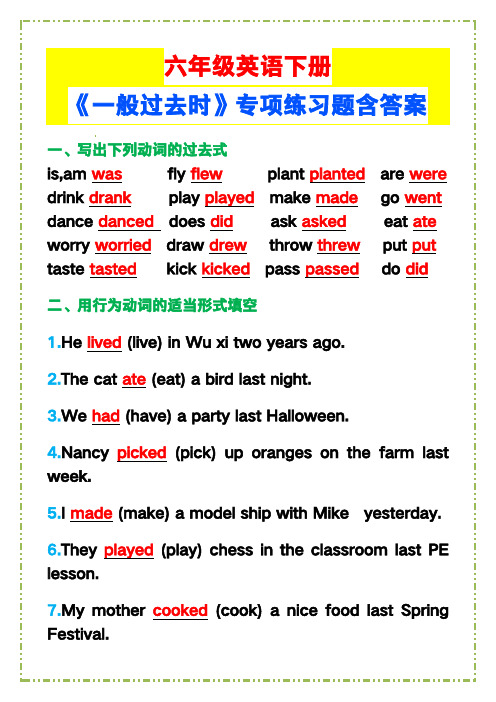
5.Imade(make)amodelshipwithMike yesterday.
6.Theyplayed(play) chess in the classroomlastPE lesson.
7.Mymothercooked(cook) anice foodlastSpring Festival.
31.I want topickapples.
But my dadpickedall of them last month. (pick)
28.Gao Shanput(put) the book on his head a moment ago.
29.Don’tcleanthe house.
Mumcleanedit yesterday. (clean)
30.Whatdidyoudojust now?
Ididsome housework. (do)
六年级英语下册
《一般过去时》专项练习题含答案
一、写出下列动词的过去式
is,amwasflyflewplantplantedarewere
drinkdrankplayplayedmakemadegowent
dancedanceddoesdidaskaskedeatate
worryworriபைடு நூலகம்ddrawdrewthrowthrewputput
12.Didyouvisit(visit) your relatives last Spring Festival?
13.Didhefly(fly) a kite on Sunday?Yes, hedid.
不规则动词过去式专项强化练习(试题)人教PEP版英语六年级下册

小升初不规则动词过去式专项强化练习班级学号姓名一、写出下列不规则动词的过去式1、(draw)2、(go)3、(do)4、(write)5、(buy)6、(take)7、(say)8、(send)9、(come) 10、(see) 11、(know) 12、(find) 13、(think) 14、(teach)15、(speak) 16、(eat) 17、(drink) 18、(wake)19、(leave) 20、(break) 21、(choose) 22、(sing)23、(draw) 24、(put) 25、(tell) 26、(lie)27、(bring) 28、(find) 29、(write) 30、(go)31、(do) 32、(say) 33、(send) 34、(come)35、(drink)二、单项选择题1. He to get very angry.A.begunB.beganC.beginned2. I my glasses when I fell.A.brokedB.brokenC.broke3. Those kids have five windows playing baseball.A.brokedB.brokenC.broke4. I have 11 studying French.A.begunC.beginned5. He told me that he had all the work himself.A.doneB.didC.done did6. Have you yet today?A.ateB.eatedC.eaten7.My father has me to talk to you.A.forbiddenB.forbadeC.forbid8.I him stealing that woman's purse.A.caughtB.catchedC.catch9. He must have 8 beers last night.A.drankB.drunkC.done drunk10. I down and broke my arm.A.fallenB.falledC.fell11. I a tire on the way to work.A.blownC.blow12. We have to the seaside resort many times.A.droveB.driveC.driven13. I haven't a bike in three years. (to ride)A.rodeB.riddenC.ride14. Someone has 10 books from the library.A.stolenB.stoleC.steal15. Godzilla up and began attacking the city.A.roseB.risedC.risen16. The song that she was very pretty.A. singsB. sungC. sang17. I have her many emails, but I've never received a response.A.writtenB.wroteC.write18. I 11 out those shoes long ago.A.woreB.worn19. He said that he two aspirins last night.A.takenB.tookC.has took20. My father across the lake.A. swumB. swimC. swam参考答案:一、Drew 、went、did、wrote、bought、took、said、sent 、came、saw 、knew、found 、thought 、taught、Spoke、ate 、drank、woke 、left、broke、chose、sang、Drew 、put 、Told、lay、brought 、found、wrote、went、did、said,drank。
PEP小学六年级下册英语单元测试题(含答案)全册
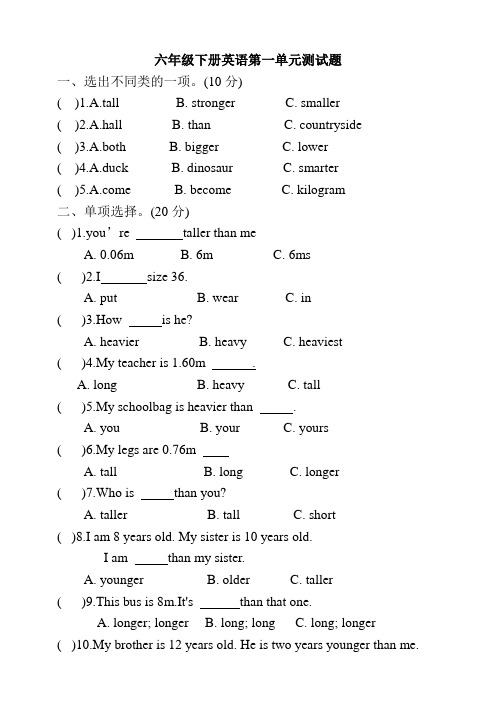
六年级下册英语第一单元测试题一、选出不同类的一项。
(10分)( )1.A.tall B. stronger C. smaller( )2.A.hall B. than C. countryside( )3.A.both B. bigger C. lower( )4.A.duck B. dinosaur C. smarter( )e B. become C. kilogram二、单项选择。
(20分)( )1.you’re taller than meA. 0.06mB. 6mC. 6ms( )2.I size 36.A. putB. wearC. in( )3.How is he?A. heavierB. heavyC. heaviest( )4.My teacher is 1.60m .A. longB. heavyC. tall( )5.My schoolbag is heavier than .A. youB. yourC. yours( )6.My legs are 0.76mA. tallB. longC. longer( )7.Who is than you?A. tallerB. tallC. short( )8.I am 8 years old. My sister is 10 years old.I am than my sister.A. youngerB. olderC. taller( )9.This bus is 8m.It's than that one.A. longer; longerB. long; longC. long; longer( )10.My brother is 12 years old. He is two years younger than me.So I am years old.A.10B.12C.14三、读一读,选择正确的答案。
(15分)( )1.想知道别人有多高,应该怎么说?A. How tall are you?B. How long are you?C. How high are you? ( )2.想知道新同学的年龄,应该怎么问?A. How old are you?B. How tall are you?C. How are you? ( )3.想知道别人手臂多长时,应该怎么说?A. How long are your arm?B. How old is your arm?C. How long are your arms?( )4.别人问你身高时,你可以这样回答:A. Are you 1.59 meters?B. I’m not 1.59 meters.C. I am 1.59 meters.( )5.你想知道Tom和小恐龙谁更高,应该怎么说?A. How tall are Tom and the small dinosaur?B. Who is taller, Tom or the small dinosaur?C. How is taller, Tom or the small dinosaur?四、从下面栏中选出正确的答语。
人教PEP六年级下册英语一般过去式讲解与综合练习

一般过去时(一)基础夯实:一般过去时1.一般过去时表示过去某个时间发生的动作或存在的状态,常和表示过去的时间状语连用。
一般过去时也表示过去经常或反复发生的动作感谢。
2.Be动词在一般过去时中的变化:⑴am 和is在一般过去时中变为was。
(was not=wasn’t)⑵are在一般过去时中变为were。
(were not=weren’t)⑶带有was或were的句子,其否定、疑问的变化和is, am, are一样,即否定句在was或were后加not,一般疑问句把was或were调到句首。
3.句中没有be动词的一般过去时的句子否定句:didn’t +动词原形,如:Jim didn’t go home yesterday.一般疑问句:在句首加did,句子中的动词过去式变回原形。
如:Did Jim go home yesterday?特殊疑问句:⑴疑问词+did+主语+动词原形?如: What did Jim do yesterday?⑵疑问词当主语时:疑问词+动词过去式?如:Who went to home yesterday?基础夯实:动词的过去式请熟记以下不规则动词的过去式:am/is—was are—were do—did go—wentcome—came swim—swam run—ran sing—sangdrink—drank give—gave begin—began win—wonhave—had get—got eat—ate sit--satfeel—felt sleep—slept sweep—swept leave—leftsee—saw draw—drew fly—flew blow—blewknow—knew throw—threw tell—told take—tookmake—made say—said ride—rode write—wroteput— put set—set hurt—hurt read—readbuy—bought teach—taught think—thought catch—caughtfight—fought bring—brought一般过去时的肯定陈述句一般过去时表示过去某个时间发生的动作或存在的状态,常用的时间状语有:yesterday , just now , last +时间, … ago , in 1980等。
PEP小学英语六年级下册考点专项训练试题一般过去时
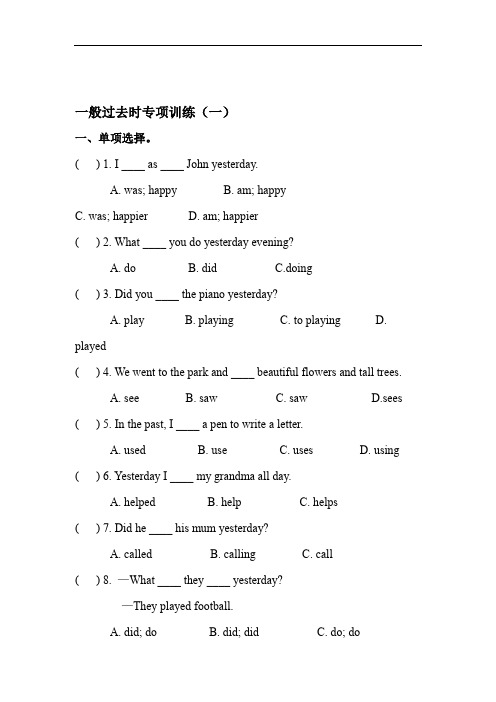
一般过去时专项训练(一)一、单项选择。
( ) 1. I ____ as ____ John yesterday.A. was; happyB. am; happyC. was; happierD. am; happier( ) 2. What ____ you do yesterday evening?A. doB. didC.doing( ) 3. Did you ____ the piano yesterday?A. playB. playingC. to playingD. played( ) 4. We went to the park and ____ beautiful flowers and tall trees.A. seeB. sawC. sawD.sees ( ) 5. In the past, I ____ a pen to write a letter.A. usedB. useC. usesD. using ( ) 6. Yesterday I ____ my grandma all day.A. helpedB. helpC. helps( ) 7. Did he ____ his mum yesterday?A. calledB. callingC. call( ) 8. —What ____ they ____ yesterday?—They played football.A. did; doB. did; didC. do; do( ) 9. John ____ to school by bike yesterday.C. goB. went A. goes( ) 10. The bell ____ at ten o'clock.A. ringB. rangC. ringing二、用括号中所给单词的适当形式填空。
1. ________ you ________(sweep) the floor yesterday?2. Sam usually ________(go) to bed early, but yesterday he _______(go) to sleep late.3. He ________(get) up at 6:30 yesterday morning.4. He ________(write) a lot of stories and fairy tales in the past.5.Little Leo worked hard and ________(become) a great artist.6. He ________(want) ________(wear) my dress last Monday.7. Did you ________(wear) Lingling's skirt.8. She lived in the new house with her family. She ________(be) happy.9. They ________(visit) the king's bedroom two years ago. They want ________ (visit)the king's house again.10. Five years ago, he ________(can) ride a bike.三、改错,将正确的句子写在横线上。
pep小学英语六年级下过去式练习题

pep小学英语六年级下过去式练习题I。
用所给的动词的适当形式填空。
1.visited2.had3.went4.XXX5.saw6.did7.Did。
enjoy8.Did。
play。
drew9.ate10.were11.watched12.read13.went。
went14.Did。
visit15.Did。
fly。
didII。
选择填空1.C (yesterday morning)1.What did Mike do last weekend?2.I cleaned my room last Sunday.4.I often help my mother do housework.5.Did you watch TV last night?6.Yes。
he did.7.They went on a trip in February。
2007.8.We're going to XXX.9.Did he play football two days ago?10.He did a lot of work this morning and he's tired.1.What did you do yesterday?2.Did John watch TV last weekend?3.I went to the park by bike。
一、动词过去式:1.do - did2.clean - cleaned3.help - helped4.watch - watched5.do - did6.go - went7.climb - climbed8.play - played9.do - did10.do - didDo you have a daily routine。
Most people do。
Here's what my typical day looks like:I wake up early in the morning and watch the news while I drink my coffee。
六年级下册英语试题语法专项练习一般过去时习题人教PEP含答案

语法专项练习- 一般过去时Ⅰ. 请写出下列动词的过去式。
go ____ have ____ play ____ is ____ write____ sit ____ see ____ take ____ win ____ say ____ run ____ read ____let ____ leave ____ cut____ teach ____ speak____ think ____ tell____ swim ____ make____ cost ____ does____ get ____ ring ____ send ____ sleep____ ride ____ lose ____ sing ____ will____ rise ____ Ⅱ. 用I/She/It was 或we/they were等完成下列句子。
例:Liz worked very late last night. She was tired.1.Jane lost his job yesterday. _______ angry.2.We laughed a lot at last night’s film. _______ funny.3.John and his dog fell into the river yesterday. ______wet.4.Yesterday was a beautiful day. _______ sunny.5.We saw a horror film on Saturday._______ really frightened.(真的令人感到害怕) 6.Peter and Sue didn’t have anything to eat yesterday.__________hungry.7.I had a great holiday last year. __________happy.Ⅲ. 请正确填入下列动词的过去式。
pep小学英语六年级下过去式练习题

一般过去时的练习I.用所给的动词的适当形式填空。
⒈He _____(visit) the Great Wall last year.2.We________(have) a good time yesterday.3.We often _______(go) to school by bus last year.4.I ________(live)in the village when I was a child.5.Mike______(see) a big tiger in the nature park last year.6.Sam_____ (do) the housework yesterday.7.______(do) you _______(enjoy) yourself yesterday?8.______(do)you _________(play) the violin in the artroom yesterday?No, I didn't. I_____(draw)some pictures there.9.. I ______ (eat) a big pizza yesterday.10.There____ (be) many sheep on the farm last year.11. I ______ (watch) a cartoon on Saturday.12. Her father _______ (read) a newspaper last night.13. We _________ to zoo yesterday, we _____ to the park. (go)14. ______ you _______ (visit) your relatives last Spring Festival?15. ______ he _______ (fly) a kite on Sunday? Yes, he ______.II.选择填空( ) 1. She watered the flowers ________.A tomorrowB sometimesC yesterday morning( ) 2.What ____ Mike do last weekend ? A do B does C did( )3.I___ my room last Sunday. A cleaned B clean C am cleaning( ) 4.I often help my mother _____ housework. A does B did C do( ) 5. _____ you _____ TV last night . A Do, watch B Did, watch C Did, watched( ) 6.---Did your dad write an e-mail yesterday ?A Yes, he did.B Yes, he does( ) 7.They _____ on a trip in February ,2007.A are goingB goingC went( ) 8.We’re going to _____ mountains tomorrow . A climb B climbed C climbing( ) 9. ____ he ____ football two days ago? A Does , play B Did , played C Did , play( ) 10.----Good afternoon, Miss Lee. How does Mike feel?----He’s tired . He ___ a lot of work ____ . A does , this morning B did , this morningIII.连词成句。
人教版PEP小学英语六年级下册单元练习试题含答案(全册)
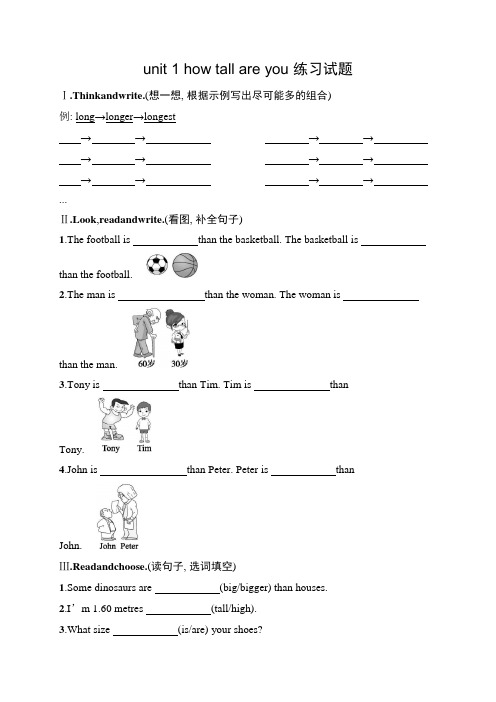
unit 1 how tall are you 练习试题Ⅰ.Thinkandwrite.(想一想,根据示例写出尽可能多的组合)例: long→longer→longest→→→→→→→→→→→→...Ⅱ.Look,readandwrite.(看图,补全句子)1.The football is than the basketball. The basketball isthan the football.2.The man is than the woman. The woman isthan the man.3.Tony is than Tim. Tim is thanTony.4.John is than Peter. Peter is thanJohn.Ⅲ.Readandchoose.(读句子,选词填空)1.Some dinosaurs are (big/bigger) than houses.2.I’m 1.60 metres (tall/high).3.What size (is/are) your shoes?4.That dinosaur is (taller/the tallest) in this hall.5.It’s (taller/the tallest) than both of us together.6.You are older and (smarter/smartest) than me.7.The sun is (getting/get) brighter and brighter.Ⅳ.Choosethebestanswer.(选择最佳答案)()1.Little Duck is watching the sun down.A.goesB.goC.to go()2.My mother is shorter and than my father.A.thinB.strongC.thinner()3.—How is the basketball player?—He’s 2.26 metres.A.tallB.highC.taller()4.—My legs are than .—Yes, and you are taller than me.A.long; yoursB.longer; yourC.longer; yours()5.— are your shoes, Sarah?—My shoes are size 36.A.How bigB.What sizeC.How tallⅤ.Readandchoose.(根据句意选择合适的图片)()1.Which animal is heavier, the elephant or the monkey?()2.Mr Li is older. Who is Mr Li?()3.My brother is stronger. Which boy is my brother?()4.Whose neck(脖子) is longer?()5.I’m thinner than my mother. Who is my mother?Ⅵ.Readandchoose.(选择合适的句子补全对话)Mike: Hello, John. How are you?John: 1. Thank you.Mike: You’re strong.2.John: I’m 49 kilograms.Mike: You are heavier than me. I’m 48 kilograms.3.John: I wear size 39 shoes. How about you?Mike: Oh! 4. I wear size 38.Ⅶ.Readandjudge.(阅读短文,判断对错。
六年级英语动词过去式单选题40题(含答案)

六年级英语动词过去式单选题40题(含答案)1.I _______ my homework yesterday.A.doB.doesC.didD.doing答案:C。
“yesterday”表明是过去的时间,要用动词的过去式,“did”是“do”的过去式。
A 选项和 B 选项是一般现在时的形式。
D 选项“doing”不能单独作谓语。
2.She _______ to school by bus last week.A.goB.goesC.wentD.going答案:C。
“last week”是过去的时间,“went”是“go”的过去式。
A 选项和B 选项是一般现在时的形式。
D 选项“going”不能单独作谓语。
3.We _______ football on Sunday.A.playB.playsC.playedD.playing答案:C。
“on Sunday”在这里指过去的某个周日,要用动词过去式,“played”是“play”的过去式。
A 选项和B 选项是一般现在时的形式。
D 选项“playing”不能单独作谓语。
4.He _______ a book last night.A.readB.readsC.readingD.readed答案:A。
“last night”是过去的时间,“read”的过去式还是“read”。
B 选项是一般现在时的形式。
C 选项“reading”不能单独作谓语。
D 选项“readed”是错误的过去式形式。
5.They _______ swimming yesterday afternoon.A.goB.goesC.wentD.going答案:C。
“yesterday afternoon”是过去的时间,“went”是“go”的过去式。
A 选项和B 选项是一般现在时的形式。
D 选项“going”不能单独作谓语。
6.I _______ TV in the evening.A.watchB.watchesC.watchedD.watching答案:C。
(完整)pep小学英语六年级下过去式练习题

般过去时的练习I. 用所给的动词的适当形式填空。
1. He ____ (visit) the Great Wall last year.2. We ______ (have) a good time yesterday.3. We often _____ (go) to school by bus last year.4.I ______ (live)in the village when I was a child.5.Mike _____ (see) a big tiger in the nature park last year.6.Sam ___ (do) the housework yesterday.7. ____ (do) you ______ (enjoy) yourself yesterday?8. ____ (do)you _________ (play) the violin in the artroom yesterday?No, I didn't. I _____ (draw)some pictures there.9.. I _____ (eat) a big pizza yesterday.10. There ___ (be) many sheep on the farm last year.11. I ____ (watch) a cartoon on Saturday.12. Her father ______ (read) a newspaper last night.13. We ________ to zoo yesterday, we ____ to the park. (go)14. _____ you _____ (visit) your relatives last Spring Festival?15. _____ he _____ (fly) a kite on Sunday? Yes, he _____ .II.选择填空( ) 1. She watered the flowers _______ .A tomorrowB sometimesC yesterday morning () 2.What Mike do last weekend ? A do B does C did ( )3.I ___ my room last Sunday. A cleaned B clean C am cleaning( ) 4.I often hel p my mothe r ___ housework. A does B did C do() 5. ____ you _ ___ TV last night . A Do, watch B Did, watch C Did, watched( ) 6.---Did your dad write an e-mail yesterday ?A Yes, he did.B Yes, he does( ) 7.They ____ on a trip in February ,2007.A are goingB goingC went( ) 8.We 're going to _________ mountains tomorrow . A climb Bclimbed C climbing( ) 9. __ he ____ football two days ago? A Does , play B Did , played CDid , play( ) 10. ---- G ood afternoon, Miss Lee. How does Mike feel?--- H e ' s tired H. e ___ a lot of work _ . A does , this morning B did , thismorningIII .连词成句。
过去式六年级下册练习题
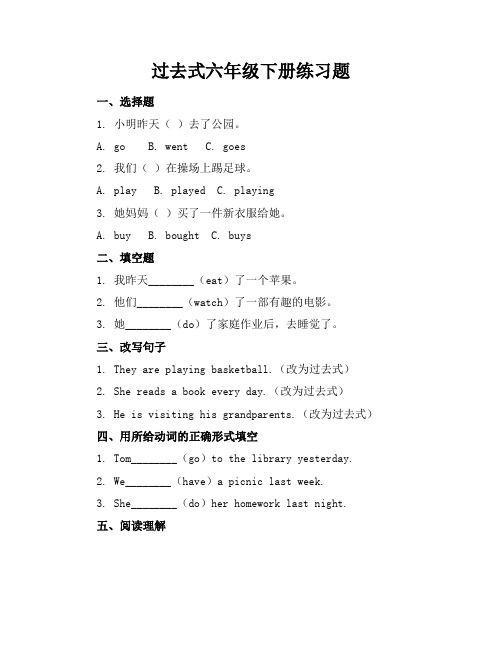
过去式六年级下册练习题一、选择题1. 小明昨天()去了公园。
A. goB. wentC. goes2. 我们()在操场上踢足球。
A. playB. playedC. playing3. 她妈妈()买了一件新衣服给她。
A. buyB. boughtC. buys二、填空题1. 我昨天________(eat)了一个苹果。
2. 他们________(watch)了一部有趣的电影。
3. 她________(do)了家庭作业后,去睡觉了。
三、改写句子1. They are playing basketball.(改为过去式)2. She reads a book every day.(改为过去式)3. He is visiting his grandparents.(改为过去式)四、用所给动词的正确形式填空1. Tom________(go)to the library yesterday.2. We________(have)a picnic last week.3. She________(do)her homework last night.五、阅读理解昨天,小明和他的朋友们去动物园游玩。
他们看到了许多动物,如老虎、狮子和长颈鹿。
小明最喜欢的是猴子,因为他觉得猴子非常聪明。
他们在动物园度过了一个愉快的下午,然后回家了。
1. 小明和他的朋友们昨天去了哪里?2. 他们看到了哪些动物?3. 小明最喜欢哪种动物?六、连线题请将下列动词与它们的过去式进行连线:1. do________2. go________3. eat________4. watch________5. play________答案:1——did 2——went 3——ate 4——watched 5——played七、完成句子1. 昨天下午,我________(read)了一本书。
2. 上个星期天,他们________(visit)了博物馆。
六年级英语下册一般过去式练习题
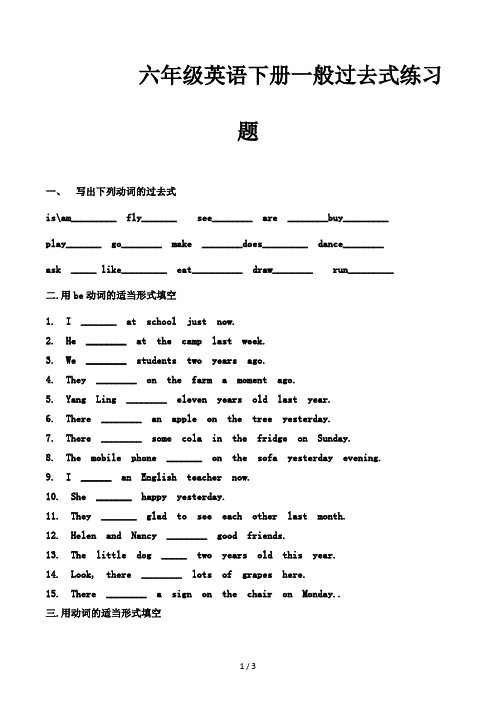
六年级英语下册一般过去式练习题一、写出下列动词的过去式is\am_________ fly_______ see________ are ________buy_________play_______ go________ make ________does_________ dance________ask _____ like_________ eat__________ draw________ run_________二.用be动词的适当形式填空1. I _______ at school just now.2. He ________ at the camp last week.3. We ________ students two years ago.4. They ________ on the farm a moment ago.5. Yang Ling ________ eleven years old last year.6. There ________ an apple on the tree yesterday.7. There ________ some cola in the fridge on Sunday.8. The mobile phone _______ on the sofa yesterday evening.9. I ______ an English teacher now.10. She _______ happy yesterday.11. They _______ glad to see each other last month.12. Helen and Nancy ________ good friends.13. The little dog _____ two years old this year.14. Look, there ________ lots of grapes here.15. There ________ a sign on the chair on Monday..三.用动词的适当形式填空1. He _________ (live) in Wuxi two years ago.2. The cat ________ (eat) a bird last night.3. We _______ (have) a party last Halloween.4. I ________ (make) a model ship with Mike yesterday.5. They ________ (play) chess in the classroom last PE lesson.6. My mother _______ (cook) a nice food last Spring Festival.7. The girls ________ (sing) and _______ (dance) at the party.8. I ______ (watch) a cartoon on Saturday.9. Her father _______ (read) a newspaper last night.10. We _________ to zoo yesterday, we _____ to the park. (go)11. ______ you _______ (visit) your relatives last Spring Festival?12. ______ he _______ (fly) a kite on Sunday? Yes, he ______.13 What ______ she _______ (find) in the garden last morning? She __ ________ (find) a beautiful butterfly.14. It ______ (be) Ben’s birthday last Friday.15. We all ______ (have) a good time last night.16. He ________ (jump) high on last Sports Day.17.She likes _____ newspapers, but she ______ a book yesterday.(read)18. He _______ football now, but they _______ basketball just now. (p lay)19. We ___________ (go) to school on Sunday.20. It _____ (be) the 2nd of November yesterday.Mr White ________ (go) to his office by car.21. Gao Shan ________ (put) the book on his head a moment ago.22. Don’t______ the house. Mum _______ it yesterday. (clean)23. What ____ you ______ just now? I ______ some housework. (do)24. They _________ (make) a kite a week ago.25. I want to _____【eat】apples.But my dad _______(eat up)all of them yesterday.。
- 1、下载文档前请自行甄别文档内容的完整性,平台不提供额外的编辑、内容补充、找答案等附加服务。
- 2、"仅部分预览"的文档,不可在线预览部分如存在完整性等问题,可反馈申请退款(可完整预览的文档不适用该条件!)。
- 3、如文档侵犯您的权益,请联系客服反馈,我们会尽快为您处理(人工客服工作时间:9:00-18:30)。
一般过去时的练习I.用所给的动词的适当形式填空。
⒈He _____(visit) the Great Wall last year.2.We________(have) a good time yesterday.3.We often _______(go) to school by bus last year.4.I ________(live)in the village when I was a child.5.Mike______(see) a big tiger in the nature park last year.6.Sam_____ (do) the housework yesterday.7.______(do) you _______(enjoy) yourself yesterday?8.______(do)you _________(play) the violin in the artroom yesterday?No, I didn't. I_____(draw)some pictures there.9.. I ______ (eat) a big pizza yesterday.10.There____ (be) many sheep on the farm last year.11. I ______ (watch) a cartoon on Saturday.12. Her father _______ (read) a newspaper last night.13. We _________ to zoo yesterday, we _____ to the park. (go)14. ______ you _______ (visit) your relatives last Spring Festival?15. ______ he _______ (fly) a kite on Sunday? Yes, he ______.II.选择填空( ) 1. She watered the flowers ________.A tomorrowB sometimesC yesterday morning( ) 2.What ____ Mike do last weekend ? A do B does C did( )3.I___ my room last Sunday. A cleaned B clean C am cleaning( ) 4.I often help my mother _____ housework. A does B did C do( ) 5. _____ you _____ TV last night . A Do, watch B Did, watch C Did, watched( ) 6.---Did your dad write an e-mail yesterday ?A Yes, he did.B Yes, he does( ) 7.They _____ on a trip in February ,2007.A are goingB goingC went( ) 8.We’re going to _____ mountains tomorrow . A climb B climbed C climbing( ) 9. ____ he ____ football two days ago? A Does , play B Did , played C Did , play( ) 10.----Good afternoon, Miss Lee. How does Mike feel?----He’s tired . He ___ a lot of work ____ . A does , this morning B did , this morningIII.连词成句。
1.did, what, you, yesterday, do. _______________________________________2.watch,John,did, TV, weekend, last. _______________________________________3. went, I ,to, by, park, a, bike _______________________________________一、将下列动词变成过去式。
do_______ is _______ watch ________ read _______ drink _______go ________ sleep______ clean ________ have ________ see________ fix ________ are ________ ride ________ hurt ________二、用括号内所给动词的适当形式填空。
1. I_______________ (buy) a new dictionary the day before yesterday.2. — What day_____________ (be) it yesterday?— It______________ (be) Friday.3. He______________ (be) here half an hour ago.4. We often____________ (play) games last term.5. She_____________ (give) me a book a moment ago.6. The girl___________ (get) up very early this morning.7. They____________ (take) photos near the river an hour ago.8. He _________ (not watch) TV yesterday evening.9. — Why _________ (be) the boy late for school?— Because he _________ (be) ill.10. Mr Green_________ (come) to visit me last night.11. The teacher_________ (agree) to our idea yesterday.12. He said he_________ (feel) terrible.13. They_________ (make) him work twelve hours a day last year.14. I _________ (see) him in the library two days ago.15. She _________ (write) her address on the blackboard ten minutes ago.1. I _________ (have) an exciting party last weekend.2. She _________(not practice) her guitar yesterday.3. He ________(watch) TV and __________(read)an interesting book every night.4. They all _________ (go) to the mountains yesterday morning.5. She _________ (not visit) her aunt last weekend.She ________ (stay) at home and _________ (do) some cleaning.6. I __________ (write) the novel every year.7. My friend, Carol, ________ (study) for the math test and ________ (practice) English last night.8. Mr. Li __________ (do) the project on Monday morning.9. Jim's weekend _________ (be not) bad.10. His mother __________ (be) a shop assistant last year.◆过去时的否定句(1)一般动词的否定句肯定:She watched TV last night. 她昨天晚上看电视了。
否定:She didn’t watch TV last night. 她昨天晚上没有看电视。
肯定:Tom went to the book shop last weekend. 汤姆上周末去书店了。
否定:Tom didn’t go to the book shop last weekend. 汤姆上周没有去书店。
肯定:My grandpa came my home yesterday. 我外婆昨天来我家了。
否定:My grandpa didn’t come my home yesterday. 我外婆昨天没有来我家。
一般动词过去时若要变成否定句,只需要在动词前面加did not(=didn’t)就可以了,即:过去时否定句: 主语+ didn’t+原形动词在过去式的否定句中,必须注意的是动词要用原形,而不是动词的过去式!为什么呢?因为did 本身已经表示过去的状态了。
(2)be 动词的否定句肯定:I was very busy. 我很忙。
否定:I was not very busy. 我不是很忙。
肯定:You were in class yesterday. 你昨天在班上。
否定:You were not in class yesterday. 你昨天缺课了。
肯定:He was at home last night. 他昨晚在家。
否定:He was not at home last night. 他昨天夜里不在家。
肯定:We were very hungry at that time. 那个时刻我们很饿。
否定:We were not very hungry at that time. 那个时刻我们并不是很饿。
想要将be动词的过去时改为否定句,其实更简单:只要在was或者were 后面加上not 就搞定了!◆过去时的疑问句(1)一般动词的疑问句陈述句:Mary walked to school yesterday. 玛丽昨天走路去上学。
